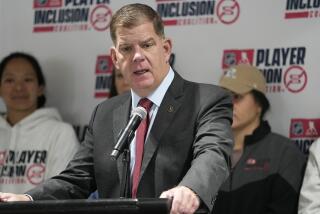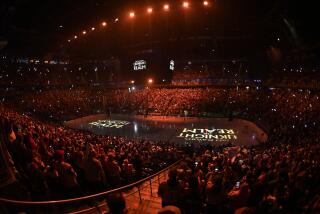Senators Are Not Winners at Bank
- Share via
The Ottawa Senators have done everything right on the ice and have played by the tough rules for survival of Canadian teams in the NHL, but still they can’t make a go of it in the country that invented the game and considers itself hockey’s guardian.
Cursed with wobbly financial underpinnings since they joined the NHL in 1992 and paid their $50-million expansion fee, the Senators are on the verge of bankruptcy. Burdened with high construction costs for the 7-year-old Corel Centre -- from which they get a miser’s share of revenues even though they paid for the highway exit that funnels fans to games -- they’re drowning in a sea of loans. They owe creditors $166 million, including $14.2 million to the NHL.
It’s probably a matter of hours before they file for court protection under the Companies’ Creditors Arrangement Act, Canada’s equivalent of Chapter 11 bankruptcy. The filing is expected to include financing to get the team through the season and pay players money they’ve awaited since Jan. 1, when a refinancing plan fell through at the last minute and owner Rod Bryden filled their pay envelopes with a letter of apology instead of a check.
Under the CCAA, companies are given 30 days’ protection from creditors while they devise a Plan of Arrangement to pay them. An independent monitor is appointed by the court to oversee the process and could preside over a sale of the franchise to satisfy creditors. It’s unclear whether the Senators would be sold with or separately from the Corel Centre, which owes $210 million to Covanta Energy Corp., which financed the construction.
The exact sequence of events is anyone’s guess. Because in addition to business considerations, this involves the sentiments of millions of Canadians who are loath to lose another team, let alone possibly lose it to an American who would buy it on the cheap and move it south of the border.
“Hockey is such a part of the fabric of our childhood and fabric of our lives. Our lives revolved around hockey, and no one wants to see financial problems in some of these Canadian cities,” said Doug Armstrong, the Canadian-born general manager of the Dallas Stars.
“We all want hockey to not only survive but have success and growth in Canada. Hopefully, in Ottawa things will get resolved so it can go. They have a great young team and hopefully they can get things in order there so they can have a great push in the second half.”
Losing a team from the nation’s capital would be the ultimate indignity, another victory by the type of U.S. businessmen who moved the Quebec Nordiques to Colorado and the Winnipeg Jets to Phoenix and bought the Canadiens, albeit with a promise to keep the team in Montreal. It merely intensifies fans’ pain to know the Senators have the NHL’s second-highest point total and are widely cited as a model of wise drafting and management because they’ve achieved so much with a $30-million payroll, among the league’s lowest.
Other factors have conspired against the Senators, notably the weakness of the Canadian dollar and the collapse of the high-tech industry, Ottawa’s largest employer after the federal government. The downturn has cost the Senators some sponsors and trimmed their attendance average to 16,324, 88% of capacity, but that’s still healthy.
Not healthy enough, apparently, to keep them in Ottawa.
Whenever an NHL franchise struggles, the name of Paul Allen, owner of the NBA’s Portland Trail Blazers, inevitably surfaces as a potential savior. He reportedly has considered bringing another tenant to the Rose Garden, but he has had many chances before now to invest in hockey and has resisted. The prospect of labor unrest after the collective bargaining agreement expires in 2004 could scare him and others away. Buying a team to lose money during a lockout makes no sense.
“I don’t think there’s any place to move one of those teams,” Flyer General Manager Bob Clarke said. “It’s easy to say, ‘Move Calgary,’ or ‘Move Ottawa,’ but why should they have to, anyway? They’re great hockey cities. Because they don’t have American dollars, does that mean you can’t be in this league? It’s just not proper.”
Maybe not, but they’re not alone in their woes.
The Calgary Flames and Edmonton Oilers have long benefited from the NHL’s Canadian Assistance Plan, which provides money to compensate for the weakness of Canada’s loonie against the U.S. dollar. “It’s not rocket science,” said Bob Berry, a former NHL coach who scouts for the Senators and has been paid for his work. “You’ve got to pay $1.40 or $1.45 to pay somebody a dollar, and it puts a strain on the hockey club and the people who pay, because they’re liable for the difference.
“There are roughly 20 jobs involved, but to have a team that’s [second] overall in the league that has these problems even accentuates it. We’re talking a pretty good hockey team.”
If creditors don’t approve the plan, the Senators will lose their protection and probably fall into bankruptcy. Not that it’s a death sentence. The Pittsburgh Penguins went through it in 1975, when the Internal Revenue Service filed a lien against the club and padlocked the doors to the Civic Arena, and again in 1998, when Mario Lemieux went from creditor to owner after a financial reorganization. The Kings voluntarily filed for Chapter 11 bankruptcy in 1998, to ease the sale of the franchise from Joe Cohen and Jeffrey Sudikoff to present owners Philip Anschutz and Ed Roski Jr., and emerged stronger.
However, those teams had buyers or managed to arrange financing. Who’s going to buy the Senators? Where would they go?
And what of the Buffalo Sabres, who play in another city considered a hockey stronghold but are failing financially? They’ve been operated by the NHL since June. An extension given proposed owners Todd Berman and Mark Hamister to assemble financing expires Friday. Bankruptcy looms there too.
“I think everybody who’s in the NHL should be alarmed by what’s going on,” Clarke said. “None of us on the outside know exactly what’s going on there, on the inside, but both of those teams have major financial problems. And Ottawa has great attendance, so it’s not like you can blame it on attendance ....
“To me, it’s not just an Ottawa and Buffalo problem. It’s a league problem, including the players, because they’re part of this league.”
Pointing fingers now accomplishes nothing. Besides, there will be plenty of that leading up to the labor talks.
This much is clear: The Senators probably shouldn’t have been admitted to the league, but owners were so eager to grab a share of expansion fees, they didn’t consider the long-term prospects of new members. It didn’t help that the Senators lost money during their first 3 1/2 seasons at the tiny Civic Centre and again by the construction costs and taxes at the Corel Centre, costs few U.S. teams must pay.
What’s less clear is how to fix all of this. Or whether it can be fixed at all, even though Commissioner Gary Bettman has said he wants to keep all Canadian teams where they are.
Senator players, incidentally, have so far reacted surprisingly well, joking that they didn’t get paid in junior hockey or missed paychecks in Europe so this is no different. Dallas goalie Ron Tugnutt, a former Senator who plans to retire to the home he owns near the Corel Centre, said he has spoken to friends in Ottawa, and they aren’t overly concerned about the delayed payment.
“They’re going through tough times right now, but they’ve been able to [operate] on a tight budget, and what are they, first overall?” he said. “They have a fabulous hockey team. Obviously if it’s a good year and good playoffs for them, that will help them
At this point, that’s as good an option as any.
More to Read
Go beyond the scoreboard
Get the latest on L.A.'s teams in the daily Sports Report newsletter.
You may occasionally receive promotional content from the Los Angeles Times.








